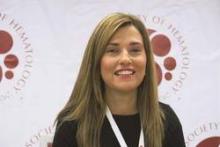The ORR in newly diagnosed patients was 100%, including partial responses and very good partial responses, and 50% in the relapsed group, including one complete response, study coauthor Dr. María-Victoria Mateos said at the briefing.
Daratumumab does not appear to have a negative effect on stem cell mobilization, with five patients electively taken off study for autologous stem cell transplantation after cycle 4.
Three of the seven patients in the POM-D arm dropped out (one because of physician decision and two because of disease progression).
The addition of daratumumab to the various backbones was well tolerated in all evaluable patients and did not result in significant additional toxicity, said Dr. Mateos of University Hospital of Salamanca, Spain.
Adverse events possibly or probably related to daratumumab included one grade 3 neutropenia in the VD arm, one grade 3 thrombocytopenia in the VMP arm, and one serious infectious pneumonia in the POM-D arm. There were a few infusion-related reactions, but most were grade 1 or 2 and occurred within the first infusions, she said.
“This is a very new and exciting concept in multiple myeloma, as we are seeing that combining this precision approach with the standard of care is leading to more effective treatment without increased toxicity,” Dr. Philippe Moreau, lead study author, of University Hospital of Nantes, France, said in a statement. “By targeting a simple molecule expressed by the cancer cells, this therapy has the potential to become a potent addition to conventional treatment.”
Dr. Brad S. Kahl, press briefing moderator, of the University of Wisconsin-Madison, was enthusiastic about the potential for anti-CD38 antibodies to transform the treatment of multiple myeloma.
“Obviously it’s very, very early, probably too early to plant a victory flag in the ground,” he said. “Having said that, the early data is very promising and totally justifies all the comments about bringing these drugs forward, aggressively moving them into the front line.”
Phase III studies are ongoing or will be initiated shortly with daratumumab plus VD in relapsed myeloma (MMY3004-CASTOR), with VMP in non–transplant eligible patients (MMY3007-ALCYONE), and with VTD as induction therapy (MMY3006/IFM-HOVON-CASSIOPEIA).


